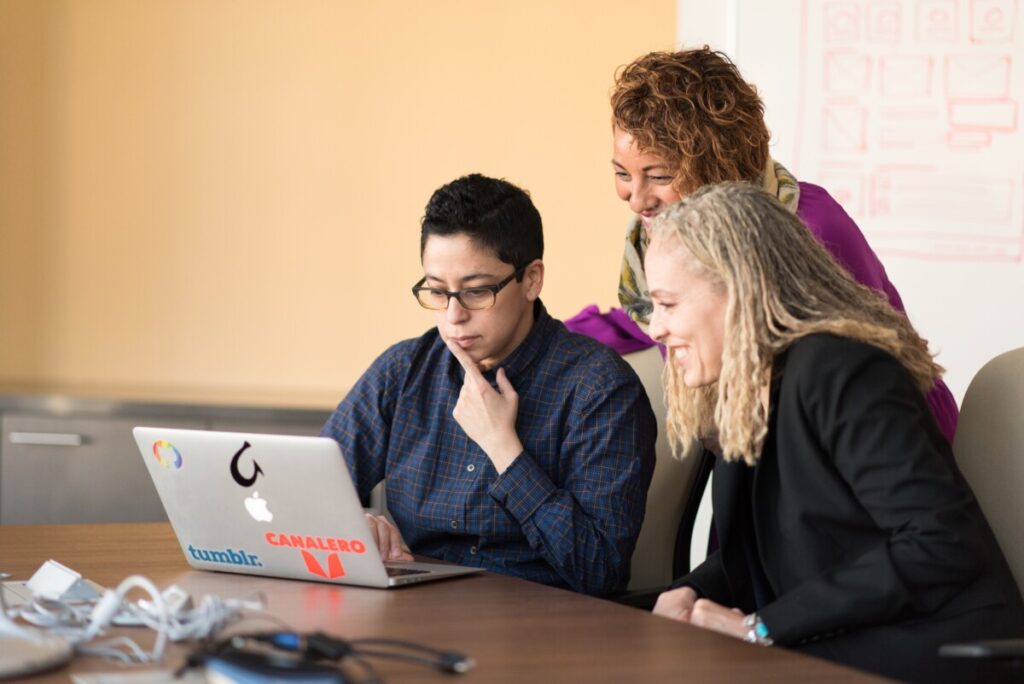What is your theology of social media and digital usage? It may not be a bad idea to start thinking about it!
Creating values and boundaries with yourself and your digital and online usage serves as a continuous mantra, or reminder, as you spend time on your phone or computer. By checking in with how you currently use and how you want to use the digital tools at your disposal, you can start to think critically and faithfully about what makes sense for your work or ministry, and what doesn’t.

So, what is a digital tool? Digital tools are any programs, websites, or online resources that make content, specifically educational content, more accessible, deliverable, and multimodal.
What is vocation? For many, vocation is where your passion and your career intersect.
Quaker theologian Parker Palmer says in his book Let Your Life Speak, “The deepest vocational question is not, “What ought I do with my life?” It is more elemental and demanding, “Who am I? What is my nature?”
Digital tools and social media can arguably take us away from finding out who we really are and what our nature really is. So, part of our theological task in this world will be learning how to regain our agency with technology and figure out how digital tools and vocation connect for each of us.
How can digital tools and your vocational journey intersect?
- They can help you to display your work meaningfully and take charge of your own storytelling.
- They organize your work routines through calendars and task managers.
- Utilizing digital tools in seminary can help you start to curate your own personal library for future reference.
1. Display Your Work Meaningfully
Digital Tools to Explore: Weebly, Wix, and WordPress alongside your LinkedIn and Resume (and maybe even your Social Media!)
I promise it can be fun to make use of blog sites, web portfolios, and free domains to display all your work online! For most of us in seminary it is not an easy or enjoyable process, nor is it necessarily a humbling one, to market ourselves online.

However, no one will know about that pivotal moment you overcame in Con Ed I if you don’t write about it. You may forget that you once designed and created real resources for your church to use for their sermon series if you don’t upload it, and the real kicker here is: no one can tell the story of your life, your experiences, or your values like you can.
One of the most meaningful objectives for your time in seminary is to find out how your life’s passions can intersect with your career or ministry. This balancing act between work and play can feel difficult to articulate and share during an interview, on your resume, or even on your social media accounts. However, when you utilize the potential that an online portfolio or blog has to offer—you don’t have to carry all your “in between” stories on your shoulders.
Use this online space to tell your story! When you tell the story of your work in this way, you can embrace both work and play. Display your meaningful experiences, work opportunities, or photos from your projects, trips, classes, writing assignments, internships, and sermons (or all of the above!) that you have taken part in that are simply too big for an elevator pitch, too dependent on photography and other media to describe, or maybe even too specific to put on your next resume. Your online portfolio doesn’t have to be perfect and you can always change it up as time goes on! The most important thing is that you have begun to tell your story, and this is a lifelong task.
Don’t Forget: Your Social Media accounts are theological demonstrations of your life!
My grandmother always starts unsolicited advice with, “Just a thought!” So—here is just a thought! Once others have found out that you have studied, have an interest in, or are ordained in a specific religion, the likelihood of them coming to you for pastoring, for counsel and advice, or for referral/networking purposes will most likely increase. If you are interested in a career or ministry that is focused on outreach or community building, it may be time to reflect on how others can find you online.
Everyone has a right to privacy online, full stop. Yes, even you and even your pastor and even her children. So, use your values, boundaries, and theology of social and digital media for when conversations around online presence arise in your work. Likewise, a hybrid style of working will continue to grow and ways of connection and communication are in constant flux. So, it may be crucial for you to be aware of your voice and impact informally online, especially if you choose to make your social media profiles public.
(Also—here is your permission to extend your theology of social and professional media to turning off notifications on your most distracting or used apps, reflecting on your how many times a day you really need to check your email, and maybe even utilizing network ‘parental controls’ on yourself by turning the Wi-Fi off at 5 PM or perhaps creating a weekly Wi-Fi-Free Sabbath Day.)
2. Try to Organize Your Life and Simplify Team Projects
Digital Tools to Explore: Google Calendar and Drive, Microsoft Office Outlook and SharePoint, Padlet, and Wrike.
Try to commit yourself for a set amount of time, like a month or a semester, to using various online calendars or organization platforms. Try it out, become an expert at it, then try the next one the next semester. (Just a thought: Ask your family, your partner, or maybe even your friends or roommates what they use and collaborate on your organizing efforts!)
By doing this you get to figure out how you work best with which organizational method, and now you’ve learned how to articulate what organizational style works best for you and your schedule. Your future supervisors, team leaders, and organizations will probably have a preferred calendar and organizing style when you join the team.
Knowing what your favorite is, as well as knowing how to adapt to another will help you feel less confused or lost at the beginning of your next job. Having done this work beforehand, you can begin your new job focused on the work you care about, instead of emailing IT on how to add your teammates calendar to your desktop.

Digital Tools to Explore: Monday, Slack, Microsoft Teams, GroupMe, and Asana.
Use digital tools to make collaboration easier in the work you are already doing in seminary! Maybe you are in a club on campus or in the community, participating in an internship, or just remembering you have a group project assignment due at the end of next month—try using one of the free versions of task management software out there.
Familiarize yourself with what worked best for each dynamic. Maybe informal methods of communication work best when you thought they wouldn’t, or perhaps you’ve realized you don’t need to separate tasks out as thoroughly as you once thought to be effective.
When you go into your next work setting, take the time to understand how this team has already been communicating about projects, what works for them, and what could be done differently through task management software.
3. Please, Don’t Throw Out that Syllabus!
Digital Tools to Explore: Zotero, Mendeley, Google Drive, One Drive, Box or External Hard Drives
Start curating your digital library as soon as possible in Seminary! Professors can sometimes spend months and even years finely cultivating their ideal syllabus for that incredibly niche, but life changing class you took last semester.

It can be easy to forget about that book your professor only assigned two chapters from, and you just needed to print it for the small group discussion last week. But once you have it your hands, something happens. You now understand how glorious and how absolutely perfect this text is for the class, your future sermon, or community project. So—you stick it in your special pile assigned for meaningful readings. (My pile is about five binders tall under my desk.) Or, even worse, the reading will forever live in your Downloads Folder, never categorized and only to be forgotten about among the various forms, documents, and photos you also downloaded that month.
I know that it is difficult to remember to organize your readings! Especially because of the time that we don’t have, spent on the work that must be done, reflection papers and essays that need to be written, not to mention your general life obligations.
So, here is just one final thought! At the end of each semester just create one “Shelving Day” for yourself and your digital library.
Re-download the readings, and the syllabi, you’ve been given and that have been meaningful for you from Canvas or Pitts Library Course Reserves and put them in a folder. Call it, “Fall 2021” or get more specific if you’d like! You can start to create your reference library wherever you like to store your files. You can get an online storage subscriptions for free (Google Drive offers storage plans as low as 1.99 a month), or even purchase an external hard drive that works for you. (Target, Best Buy, or even Amazon have hard drives with a fair amount of storage from $20 to $200.)
Then, and most importantly, use Zotero or Mendeley to simply copy and paste the citations from the syllabi for the readings you have stored away. These tools will keep a continuous bibliography for you and your new personal library. Not only will this help you call back to important readings in your academic or work life, but you never know when someone will ask for your reading suggestions, what you think, or where to look further.
Starting this theological work around digital tools and vocation while you are in seminary will make it easier for you to help your team, your congregants, and yourself down the line.
